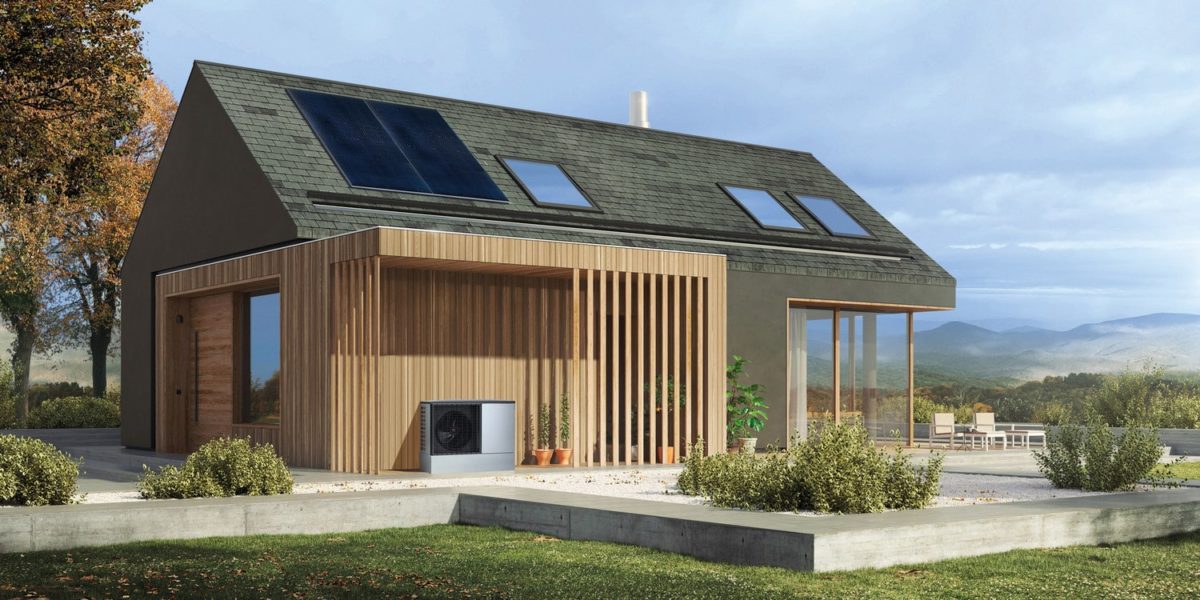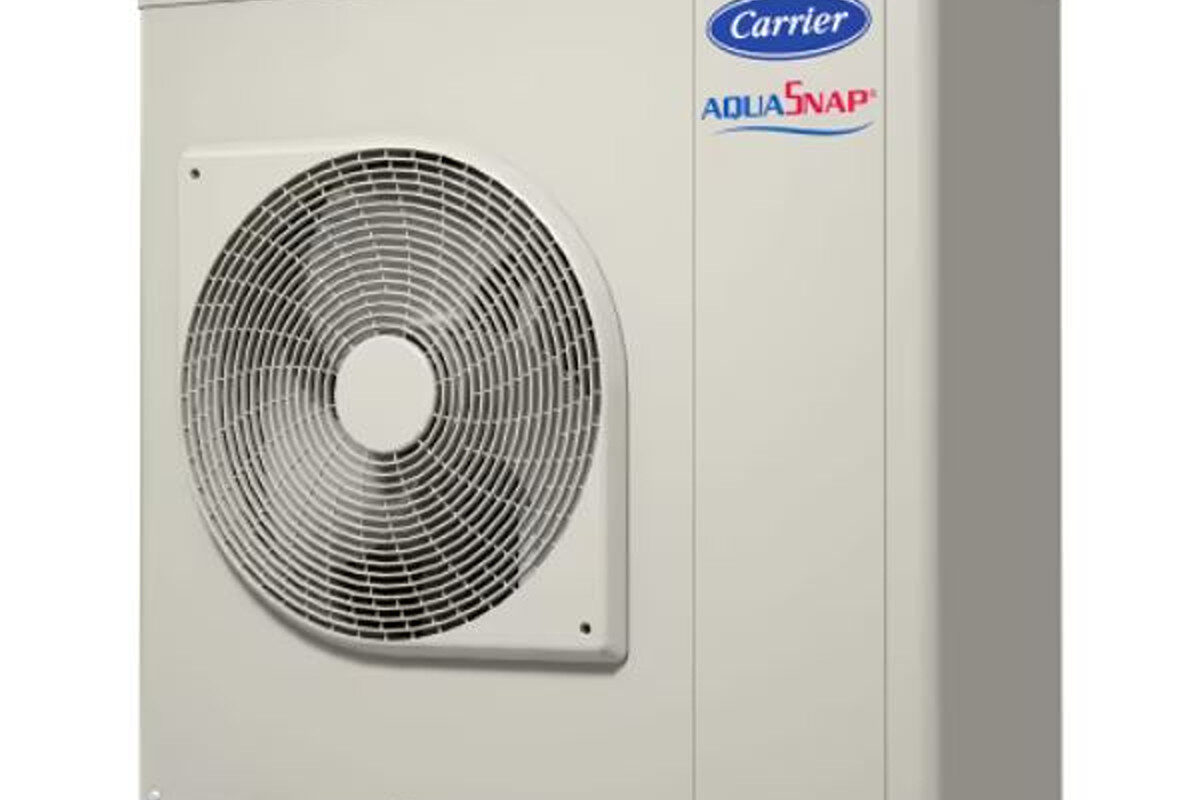Air-source heat pumps can operate at high efficiency in cold weather conditions, according to real-world monitoring data from the UK-based Electrification of Heat Demonstration Project.
“With the release of this data, we can finally put to bed the notion that heat pumps do not work in cold weather conditions and that they are inefficient to run,” said Marc Brown, interim business leader of Energy Systems Catapult. “We’ve observed the exact opposite. They are three times more efficient than gas boilers and work in cold weather conditions.”
The project is funded by the UK Department for Energy Security and Net Zero, which commissioned Energy Systems Catapult, a non-profit net zero innovation center, to report on the data. A total of 742 air-source heat pumps were installed in detached homes, semi-detached homes, and terraced houses, as well as flats. The age of the properties spans from before 1919 to 2001 and later.
The heat pumps were installed by three delivery contractors – Warmworks, E.ON, and OVO Energy. Their performance was monitored from November 2020 to August 2022, with seasonal performance factors (SPF) indicating their in-situ efficiency over the course of 12 months. Results show a median SPF of 2.80 across heat pump types, operational patterns, and home types.
“This is a significant increase of around 0.3 to 0.4 (30% to 40%) since the Renewable Heat Premium Payment scheme (RHPP) heat pump trial was undertaken between 2011-14,” Energy Systems Catapult said in a statement, referring to an incentive scheme put in place by the UK authorities. “Innovation in the industry and in the heat pump systems themselves is likely a leading factor in this performance improvement.”
Figures also show considerable performance variation across heat pump models, with refrigerant and flow temperature being key culprits. The median SPF for heat pumps using R32 refrigerant was 2.94, followed by propane (R290) at 2.89, and R410a at 2.66. Their global warming potentials (GWPs) are 675, 3, and 2,088, respectively.
As for operating flow temperature, data shows that heat pumps that can reach temperatures above 65 C have median SPFs between 2.89 and 2.92, while low operating temperature heat pumps have SPFs between 2.74 and 2.94. However, the report says that “operating above 65 C is not a common occurrence, with 81 of the 94 heat pumps operative above 65 C flow temperature less than 1% of the time.”
The project also analyzed heat pump performance during the coldest days of the year in the UK, when mean external temperatures varied from -5.8 C to 2 C. Their coefficient of performance (COP) was calculated for each of the cold days, with a mean of 2.44.
“This result indicates that heat pumps continue to operate with high efficiency – providing the requisite heat to homes – in a wide range of property types even in cold weather conditions,” Energy Systems Catapult said.
Brown concluded that heat pumps have been shown to work.
“The UK is heat pump ready. Now we need to apply those learnings,” Brown concluded. “Government and industry should commit to investing in upskilling existing installers in low-carbon heating solutions and doing more to attract new talent into the sector.”
This content is protected by copyright and may not be reused. If you want to cooperate with us and would like to reuse some of our content, please contact: editors@pv-magazine.com.



Ha -6*C is not even cold! I run my heat pump in Canada and it works quite efficiently up to -10*C and somewhat efficiently up to -15*C after that forget about it. And it’s a -30*C heat pump from Seville aura series. And I’m off grid so I watch every watt!
Heat pumps are efficient at their job, as long as the property is properly Insulated. The downsides are the units outside freezing and the fact that electricity is anywhere between 34 pence and 50 pence a kilowatt during the day. This makes it more expensive than gas currently which is 9.75 pence a kilowatt. If these units a fitted into modern builds which are stringently Insulated and fitted with 8 x 400 watt solar panels and lipo4 battery system, then they stand a good chance of being efficient and cheap to run.
Basically the report states the heatpumps worked well.
It does not state that it is more cost efficient compared to gas or oil heating. There is no data to back it up.
Besides, the report tries to impress people with tecnical terms as SPF and COP, and the core message is that the pumps they have now, are better than older models.
Not a word how they cost wise compare with gas and electric boilers. We don’t just need to heat our houses, we need hot water as well for showers, baths, etc. How quickly can this thing heat up a boiler tank? Not a word.
There is no advantage for the climate at all folks, please don’t believe that stuff.
The report also states it has a Global Warming Potential between 600 and 2000. Again, bla bla nonsence. And does not explain what it is.
Stick to what you have. These things are VERY expensive to run. That’s why they don’t mention it.
Great info.
Interesting article, but disappointing it does not indicate likely running costs.
With electricity for domestic premises being expensive what is the cost comparison to a gas or oil fueled boiler ?
This is technobabble dressed up as science. In 2023 hundreds of heat pump users have described the failure of these devices to adequately heat their homes during the winter of this year and an overwhelming desire to return to gas central heating. Part of the problem will be down to the models in use and partly the effectiveness of system installation and this being the UK there is likely to be the “cowboy coefficient”. I think it likely that this technology is being wished upon us without adequate investigation and research. The same applies to the next big environmental disappointment, viz electric cars and for which there is a growing body of evidence re downsides. The UK is neither Scandinavia or Germany where these things are done properly. There are other issues, the use of hydrogen fuel in particular, which latter is being widely rubbished in the UK, whereas the Germans are committing serious money to its economic and environmentally sustainable development.
2.8 times more efficient but gas is 3.4 times cheaper. No financial incentive to change over.
If only we would not exclude air to air source (a2) heat pumps in the UK. These are not classed as heat pumps and therefore use is discouraged in all possible ways, from not being suitable for grants and subsidies or VAT relief to not being deemed suitable for heat pump tariffs or being classed as detrimental to the energy performance of the building.
This is totally nonsensical as particularly a2a heat pumps do not need a complete overhaul of the hydraulic system and can always operate at low temperatures, even in the oldest building. Also a2a heat pumps open the market for many flats, which would not be able to have an outside heat pump unit and thus are reliant on either a2a or water source heat pumps, with the latter requiring a communal supply network.
It is non-sensical to compare an electric device to a gas one, without considering the transmission and generation losses of the grid. Once including a 50% best case efficiency for thermal generation at night, plus a 30% transmission loss, those end use comparisons are very similar to a 96% gas furnace.
The COP on a cold day( I.e. when I have the heating on ) is 2.4 so if I want 2.4 kw of heat I have to pay for 1kw of electricity
For the price of 1 kw of electricity I can buy 4kw of gas,
Have I misunderstood your figures?
-5 C is not cold climate is mild cold! – 15 C is cold and can go to – 25 C for few days… What would you do then? If when you need it most fails to heat your house?!
At a COP of 2.44 is it still more expensive though to use a heat pump to heat a UK home in winter than using gas?
Electricity costs a bit over 3x as much per kWh, but less often mentioned are the losses due to inefficiency in burning the gas and capturing the heat plus the use of electricity to pump that heat around the house.
What COP represents break-even for median gas and electricity pricing?
Seriously, you efficient experts need to include the cost of operating and maintenance of electric heat pumps. Some locations have power rates of 6 cents per kWh and others have rates that are 50 cents/kWh. Plus, location matters and needs to be considered with rates due to extreme temperatures from cold to hot when the systems will definitely be in operation for long periods. So far, the above information is not good enough to suggest they are efficient compared to natural gas, propane etc. We never hear about natural gas HVAC heat pumps…they would beat any electric heat pump or air conditioning that is electric powered. Also, 100% emissions free is false advertising when anyone is suggesting electric anything is emissions free. The power mostly comes from natural gas generated electricity so the emissions will increase in those locations.
If a boiler operates at 90% (and many don’t even do that for much of the time), and the ASHP average across the year is a COP of 2.8, then that is equivalent to 280% efficiency, Therefore we need electricity to be less than 3.1 times the price of gas to break even (90% x 3.1 = 280%). If we can include a thermal store, and a cheaper night-time tariff, then in many cases you may just about break even. Solar panels will help even more.
Building insulation will also be a factor in the efficiency, as better insulated buildings can operate at lower flow temperatures, which allows the heat pump to operate at higher COPs.
However to do all this requires a large initial capital outlay (and the space to do it).
The only way to incentivise people to invest in this kind of technology is to reform the energy market, so that non-commodity tariff costs are transferred from electricity to gas, to ensure the price difference between gas and electricity is not a barrier to decarbonisation
My heat pumps froze every winter, in Texas! The new system failed to engage the defrost cycle and the installer had to replace the inside core under warranty, course it took them 5 years to address the issue due to few freezing days. The r410 carrier system from 2000 would freeze but it did defrost. I would have to set the systems to resistive heat (turn off heat pump) due to the outside unit freezing up which would cause the system to run constantly turning the outside unit into a solid block of ice. I’m sooo glad I now have natural gas heat!